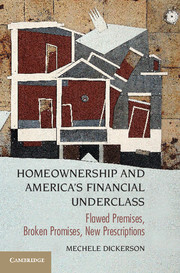 Homeownership and America's Financial Underclass
Homeownership and America's Financial Underclass Book contents
- Frontmatter
- Dedication
- Contents
- Acknowledgments
- 1 Chasing the American Dream
- 2 The Happy Homeownership Narrative
- 3 U.S. Support for Homeowners
- 4 The Homeownership Crisis
- 5 Homeowner Harm and the Blame Game
- 6 Flawed Premises
- 7 The Burden of Home Buying While Black or Latino
- 8 The Benefits of Home Buying While Black or Latino
- 9 Homeownership: Educational Disparities
- 10 Homeownership: Income Disparities
- 11 Outlook and Prescription for the Future
- Index
- References
2 - The Happy Homeownership Narrative
Published online by Cambridge University Press: 05 July 2014
- Frontmatter
- Dedication
- Contents
- Acknowledgments
- 1 Chasing the American Dream
- 2 The Happy Homeownership Narrative
- 3 U.S. Support for Homeowners
- 4 The Homeownership Crisis
- 5 Homeowner Harm and the Blame Game
- 6 Flawed Premises
- 7 The Burden of Home Buying While Black or Latino
- 8 The Benefits of Home Buying While Black or Latino
- 9 Homeownership: Educational Disparities
- 10 Homeownership: Income Disparities
- 11 Outlook and Prescription for the Future
- Index
- References
Summary
Americans love the idea of Home Sweet Home. A statement, written more than thirty years ago by a trade association for savings and loans banks, continues to capture this nation’s virtually unconstrained adoration of homeownership:
A family’s home is much more than shelter. A home signifies the family’s accomplishments in life, eloquently expresses its personality, establishes its place in the community, and defines the perimeter of its private and personal stake in society. Indeed, the American dream traces its origins to the very beginning of this country, to the quest of those first colonists for the freedom to rule over their own domain, no matter how small, no matter how meager. This is a dream shared by those who have come to this country, and it is the rightful heritage of all Americans.
Even after enduring the worst housing crisis since the Great Depression, homeownership still remains enormously popular among Americans of all ages, races, and incomes.
For decades, U.S. housing policies have reinforced this rhapsodic view of homeownership. Indeed, for almost eighty years, the U.S. government has provided significant subsidies for people who want to rule over their own domain. U.S. leaders staunchly defend these subsidies based on assumptions and beliefs that collectively form what I will call the “Happy Homeownership Narrative.” In the Happy Homeownership Narrative, homeownership brings out the best in people. It makes them more involved as citizens, and it strengthens the moral and economic fiber of the country. Homeowners are viewed as being noble, hardworking, responsible, and financially stable and secure. In stark contrast, renters are viewed as weak and financially vulnerable. In the Narrative, homeownership creates stronger neighborhoods and improves society overall. Every citizen should strive to become a homeowner. Renting, on the other hand, is a parasitic state that people should aspire to flee from as soon as they possibly can.
- Type
- Chapter
- Information
- Homeownership and America's Financial UnderclassFlawed Premises, Broken Promises, New Prescriptions, pp. 19 - 37Publisher: Cambridge University PressPrint publication year: 2014


